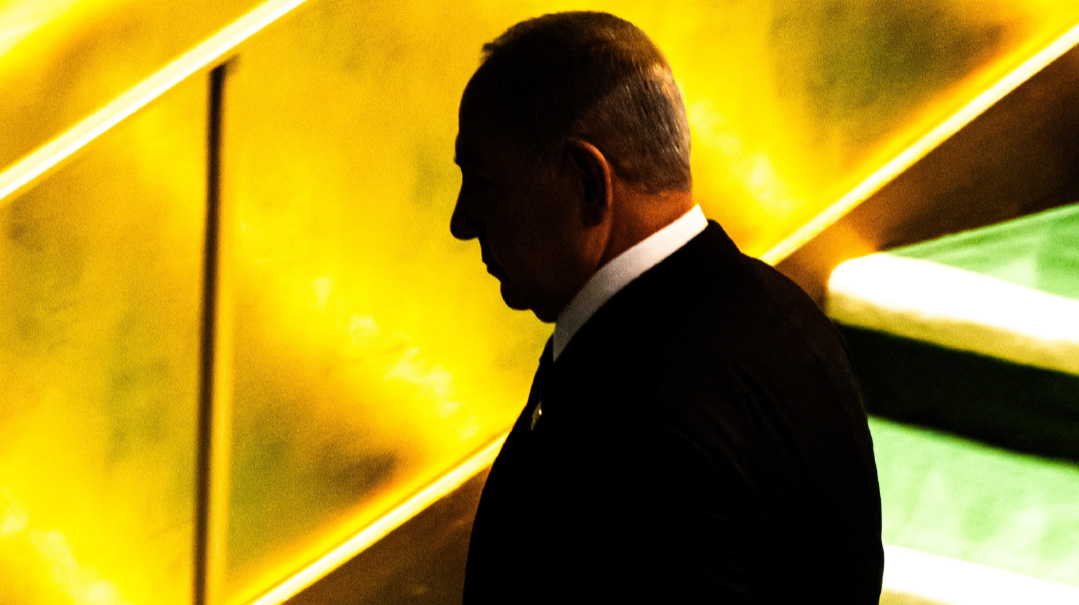A Question for Mr. Security

Why are so many Israelis still clamoring for an agreement? The easy answer is their hatred of Bibi

Y
ears ago, the eminent editor in chief of this magazine, Rabbi Moshe Grylak, posed a horror scenario to me. “Imagine a band of Hamas terrorists take a school bus of Jewish children hostage and pose an ultimatum: Give us Yerushalayim if you want your kids back. What would we do?”
Rabbi Grylak wasn’t a navi but he was a keen observer. If you’ve been following the patterns here in this little strip of highly coveted land, you know how negotiations tend to work: an outside actor brings the two parties to the table. An initial deal is drawn up. One side — the one that wants it all, and will slaughter and terrorize to get it — says no. The other side — the one that wants peace, and will sacrifice and submit to get it — is pressed to concede a bit more. The first side refuses yet again. The second side is squeezed harder.
It ends in one of two ways. The more prevalent way: the first side abandons the entire deal, refusing even the most generous offer. Then the media and history books judge Israel for not being flexible enough. And the enemy delights in the division, strife, and outright hatred that shredded Israeli morale over weeks or months of passionate finger-pointing and protests.
The other conclusion has the manipulative negotiators accepting the offer at some late stage when the concessions have ballooned way past any reason. Israel then pays two prices: an initial painful price, and then later an even more painful price, when released prisoners, newly available land, and/or infusions of cash and resources (like cement and building supplies) facilitate more death and destruction.
Very few people deny this drill. It’s clear to most Israelis that Hamas has been toying with their collective psyche during the last 11-plus months, relishing the explosion of blame and conflict that ensues upon each refusal of a newly revised ceasefire deal. And it’s also clear that if a deal is finally reached, it will come with a terribly painful price. So why are so many Israelis still clamoring for an agreement?
The easy answer is their hatred of Bibi. If you hate Bibi, you hate his stewardship of this war and his stubbornness over every clause of each new iteration of the hostage deal. It takes an especially potent kind of hatred to call him the “murderer” of the six hostages killed by Hamas, but the animus has been simmering for years, so it didn’t require much fuel to boil over.
Let’s be honest, though. Not everyone who wants a deal is a Bibi-hater. And even among those who don’t much like Bibi, part of what’s motivating their weekly protests is their very human pain at the thought of leaving the hostages behind.
If you listen to some of the families of the hostages — those killed this time and some who were killed earlier — you hear a voice that sounds different from the usual outrage and hatred.
You hear dazed grief from parents of a hostage found dead many months ago, who rejoiced at the rescue of her friend and fellow hostage but noted, too, that somehow their family didn’t get a phone call from Mr. Security when the news wasn’t so triumphant. You hear a sigh from a father who spent months praying for the best, dreading the worst, and at the bitter end — when he did receive a phone call — conceded, “Did he do everything he could to save my son? No, I can’t say that he did.”
I didn’t grow up in this tough neighborhood and my opinion isn’t as informed as those who spent their school years diving under their desks for bomb drills. Like many frum Americans, I viewed Bibi as a strong leader with the shoulders, brains, and experience to make tough strategic decisions for his country.
Whatever you think of his 2015 address to Congress — whether it was strategically wise or otherwise to publicly poke holes in Obama’s proposed JCPOA — he was clearly motivated by a sense of destiny: It is my mandate and mission to keep my people safe, and I will do whatever I can to block Iran’s acquisition of the bomb.
Projecting strength is in itself a strategy and in the Middle East it’s usually a good one. This particular Mr. Security has made that strategy his trademark. He marshals PowerPoint presentations and lots of facts to make his case to the press and to the people in his stentorian voice, conveying utter confidence and competence in his decisions (and often, contempt for those who think differently). Maybe that’s what he was told a prime minister should do, especially a prime minister in the most threatened country in the Middle East. But maybe his people are currently looking for something else. Maybe along with the prodigious brain, people want to see evidence of a heart.
You know, there’s something I always noticed and appreciated about the people of this country. As hardened and cynical as you think Israelis might be, they’re actually not a cold, calculated nation. For all their prickliness, for all their weathered exteriors and tough talk, you see men cry here. You see fathers melt over their little (or big) girls. You watch macho taxi drivers become docile lambs when their wives or mothers mommy them over the speakerphone (men actually get called “mami” here as a term of endearment). Emotion is a valued currency here, and it doesn’t make someone less of a gever if he tears up sometimes.
To be fair, Bibi has tried showing sympathy in recent weeks. It hasn’t gone all that well. Partly because his shivah calls and expressions of regret are rebuffed by people who see him as an enemy. But it’s also because he tends to turn stiff and defensive instead of absorbing and mirroring pain.
And while there are plenty of Bibi faithful who support his every decision, there are also longtime supporters who are beginning to wonder. As it’s growing steadily and depressingly clearer that he can’t achieve all his war objectives, that his initial claims of “increased military might will win us more hostages” are not playing out as neatly as he predicted, that absent a dramatic Divine turnaround lot of those missing spouses, siblings, and children will return home in body bags at best, does he feel the pain?
Sometimes there’s a moment when doctors have to tell parents of a very ill child, “We’ve tried everything and explored every avenue. At this point, there is nothing we can do for your child.” It’s a shattering thing to hear. But when the doctor has truly tried everything and makes the sorrowful pronouncement with genuine pain, the parents feel it.
Maybe out there in the world at large, they say an effective leader ignores emotions and focuses on cold logic. Emotion colors and clouds reason, and reason certainly needs to take a prime position in the war room. A wartime leader needs determination, grit, and a vision that isn’t clouded by tears. But does that mean he should make decisions with a cold heart?
The formative leaders of our nation weren’t chosen for their brains alone; what made them worthy of leadership was their capacity to make decisions while feeling the pain of the weakest sheep in the flock. (Even today, if you have ever been privileged to discuss weighty issues with Torah leaders, you’ve likely seen them considering emotional costs and human factors as crucial parts of the total picture. And you’ve heard the undertone of empathy in their final decision, even as it resonates with deep and total sechel.) But the current State is so tragically distant from the glory of our formative years and its leadership is nothing like that model.
Maybe Israel truly cannot afford to lose control of the Philadelphi Corridor. Maybe the risk of future loss supersedes the reality of current loss. These are the tough, unenviable dilemmas of a wartime leader.
Mr. Prime Minister, we want to be able to trust you to consider all these terrible realities and choose what’s best for the nation’s continued existence. But we want to trust, too, that as you weigh the fatefully flawed options, you feel the full burden of each one.
Do you?
(Originally featured in Mishpacha, Issue 1030)
Oops! We could not locate your form.







